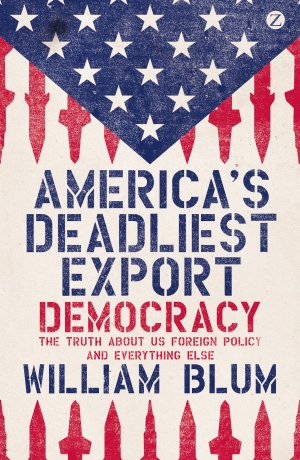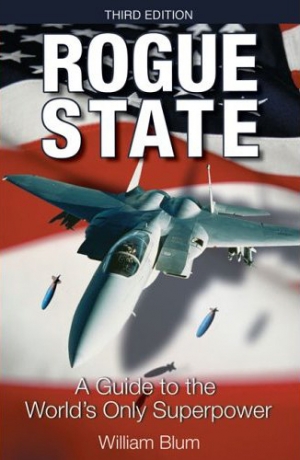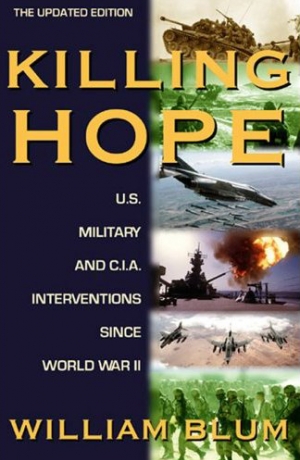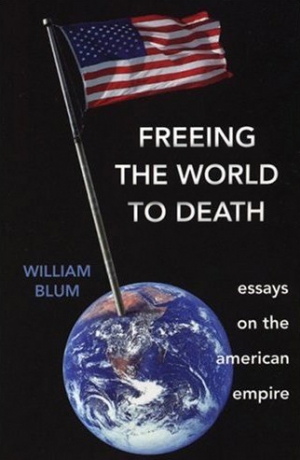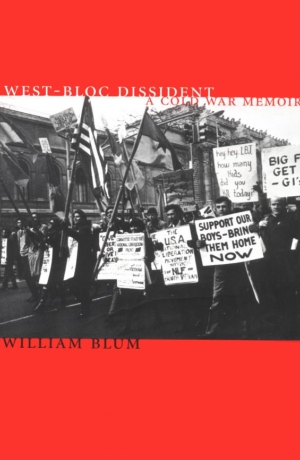If John Kerry is the answer, what is the question?
By William Blum
Of all the issues that the presidential campaign will revolve around, none is more important to me than foreign policy. I say this not because that is my area of specialty, but because the bombings, invasions, coups d’état, depleted uranium, and other horrors that are built into United States foreign policy regularly bring to the people of the world much more suffering and despair than any American domestic policy does at home. I do not yearn for “anybody but Bush”. I yearn for a president who will put an end to Washington’s interminable indecent interventions against humanity. This is, moreover, the only way to end the decades-long hatred that has spawned so many anti-American terrorists.
So desperate am I to have the chance to vote for someone like that, that a few days ago I allowed myself to feel a bit buoyed when John Kerry, in response to a question about the situation in Haiti, said that the Bush administration “has a theological and ideological hatred for Aristide” which has led to the administration “empowering” the rebels. 1 To me that remark revealed a significant nuance of understanding of the world of US foreign policy that rarely makes it to the lips of an American politician. Could it be, I wondered, that Kerry is actually a cut or two above prevailing wisdom and rhetoric on such matters? (I must point out that, holding little expectation, I seldom closely follow who’s who amongst establishment politicians, so until very recently I knew almost nothing specific about Kerry; in fact, I only just learned to distinguish him from Bob Kerrey, former senator from Nebraska.)
As it happens, the next day Kerry delivered a talk entirely about his views on foreign policy, particularly about the war on terrorism. 2 And my heart lost its buoyancy.
He called for an increase of “40,000 active-duty Army troops” – not exactly the kind of relief our shell-shocked world hungers for.
“But nothing else will matter unless we win the war of ideas,” Kerry said. “We need a major initiative in public diplomacy to bridge the divide between Islam and the rest of the world. For the education of the next generation of Islamic youth, we need an international effort to compete with radical Madrassas.” – This is the stuff of public relations, improving “image”, ignoring the reasons for anti-Americanism. The problem, however, ain’t a misunderstanding and it ain’t due to poverty. It’s the interventions, stupid; it’s the harm we do to those people.
“We have seen what happens when Palestinian youth have been fed a diet of anti-Israel propaganda,” Kerry added. Again, no weight given to anything Israel has done to the Palestinians; it’s all just a matter of propaganda; Palestinians are becoming suicide bombers because of something someone said, not because of the Israeli devastation of their lives.
In fact, the US has done remarkably well in “the war of ideas”. As noted in chapter 2: In June, 2003 the Pew Research Center released the results of polling in 20 Muslim countries and the Palestinian territories which revealed that while people interviewed had much more “confidence” in Osama bin Laden than in George W. Bush, “the survey suggested little correlation between support for bin Laden and hostility to American ideas and cultural products. People who expressed a favorable opinion of bin Laden were just as likely to appreciate American technology and cultural products as people opposed to bin Laden. Pro- and anti-bin Laden respondents also differed little in their views on the workability of Western-style democracy in the Arab world.” 3
Kerry actually refers to this poll in his talk, but he mentions only the support of bin Laden, not the apparent contradictions found in the rest of the results.
“I will strengthen the capacity of intelligence and law enforcement at home and forge stronger international coalitions to provide better information and the best chance to target and capture terrorists even before they act.” – As if the United States was not already wiring, tapping, bugging and surveilling every institution in the known world and every creature that moves across the earth, and summarily imprisoning them by the thousands. It sounds like a remark Kerry threw in, as with many of his other remarks, hoping to demonstrate a nonexistent difference between his foreign-policy views and those of the Bush administration.
“I will not hesitate to order direct military action when needed to capture and destroy terrorist groups and their leaders.” – As The Washington Post observed, “Kerry appeared to outline his own preemptive doctrine in the speech.” 4
Kerry faulted Bush for providing insufficient funding for the National Endowment for Democracy. He probably thought he was on safe ground here; the word “democracy” always sells well. But this is his most depressing comment of all. He’s calling for more money for an organization that was set up to be a front for the CIA, literally, and that for 20 years has been destabilizing governments, progressive movements, labor unions, and anyone else on Washington’s hit list. 5 Which would be a worse mark against Kerry, that he doesn’t know this about NED, or that he does know it? It sounds like another throwaway to imply a divide between him and George W.
So, what do we have here? Not a single word about the tens of thousands killed by US military actions in Afghanistan and Iraq; not a word about anything the United States has ever done anywhere in the world that could conceivably lead to anyone ever harboring justified resentment against the United States and seeking retaliation.
Not a word about ending, or even lessening, interventions.
It does not require total cynicism to point out that at most, at best, John Kerry’s beef with the Bush administration over foreign policy – to the extent that he really has any – is a very minor difference of opinion between technocrats, Kerry offering a few tiny adjustments, a tweaking here or there. Most of his policy suggestions concerned things already being done by the Bush administration.
In sum total, nothing at all threatening, or even challenging, to business as usual for American foreign policy. What relief from the bully’s outrages can the world expect from a John Kerry administration? What relief from the outrages done in our name can we Americans expect?
I think I can go back to ignoring establishment politicians.
Notes
- Newsday (New York), February 27, 2004
- Talk at UCLA, February 27, 2004
- Washington Post, June 4, 2003, p.18
- Ibid., February 28, 2004
- See the author’s essay on NED at http://members.aol.com/superogue/ned.htm
